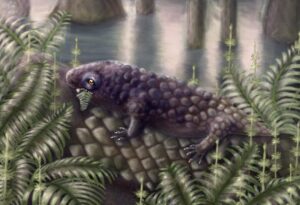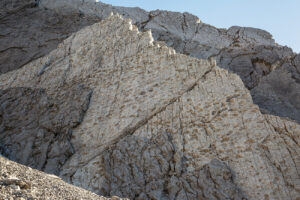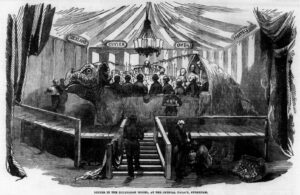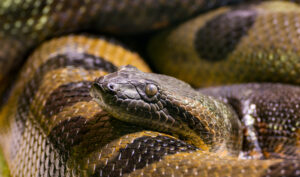Why did the dinosaurs go extinct? An asteroid, volcanoes, and more recently, dust have all featured in theories put forward. Now a recent study suggests that volcanoes and asteroids were both to blame.
Ancient rocks from the Deccan Traps supervolcano, in India’s Western Ghats mountains, contain significant amounts of sulfur and fluorine. By studying these rocks, researchers can estimate how much of these chemicals an eruption released. Here, they estimate that between 86,000 and 466,000 cubic kilometers of sulfur gas flooded into our atmosphere.
So much sulfur would have caused global temperatures to drop by 10˚C. This led to volcanic winters lasting decades.

Deccan Traps Volcanic Mountains in western India. Photo: Princeton University
Fluorine would not have affected the temperature but caused acid rain, inhibited the growth of plants, and poisoned certain animals. All this could have affected the dinosaurs.
Other studies have estimated when the temperature drops occurred throughout the Cretaceous period. All coincided with the layers of sulfur compounds in the Deccan Traps rocks.
The volcano erupted 200,000 years before the famous asteroid hit Mexico’s Yucatan Peninsula and dinosaurs went extinct. Researchers believe that this and the repeated volcanic winters that followed created a “global biotic crisis.” It essentially weakened the dinosaurs for 200,000 years.
With less available food because of the fluorine and cold temperatures because of the sulfur, they would have been in a very vulnerable state. The Chicxulub asteroid was the final blow.
“This cooling changed the climate so much that it made it difficult for the dinosaurs, and the meteorite was the coup de grâce,” study co-author Don Baker told The Washington Post. “That was the final extinction event, but they were not in good shape before that meteorite impact.”

A map of the location of the Chicxulub crater. Google Maps/UT Jackson School of Geosciences
Compromise theory
The study helps to bridge several ideas about the extinction of the dinosaurs. It supports what is called the “press-pulse extinction model.” This compromise theory suggests that environmental stressors weakened life on Earth and made it more susceptible to the asteroid that crashed 66 million years ago.
The impact of the meteor thrust huge quantities of silicate dust into the atmosphere. Another 2023 study suggests that this dust blanket was so thick that sunlight couldn’t penetrate it for years. Photosynthesis almost completely stopped; all food chains were wrecked.
On top of all of this, the asteroid strike was so powerful that some material jettisoned temporarily beyond our atmosphere and into space. When it reentered, it caught fire, causing wildfires that devastated half the planet.
No one will ever know exactly what happened, but it seems clear that there is not one single cause of the dinosaurs’ demise.






